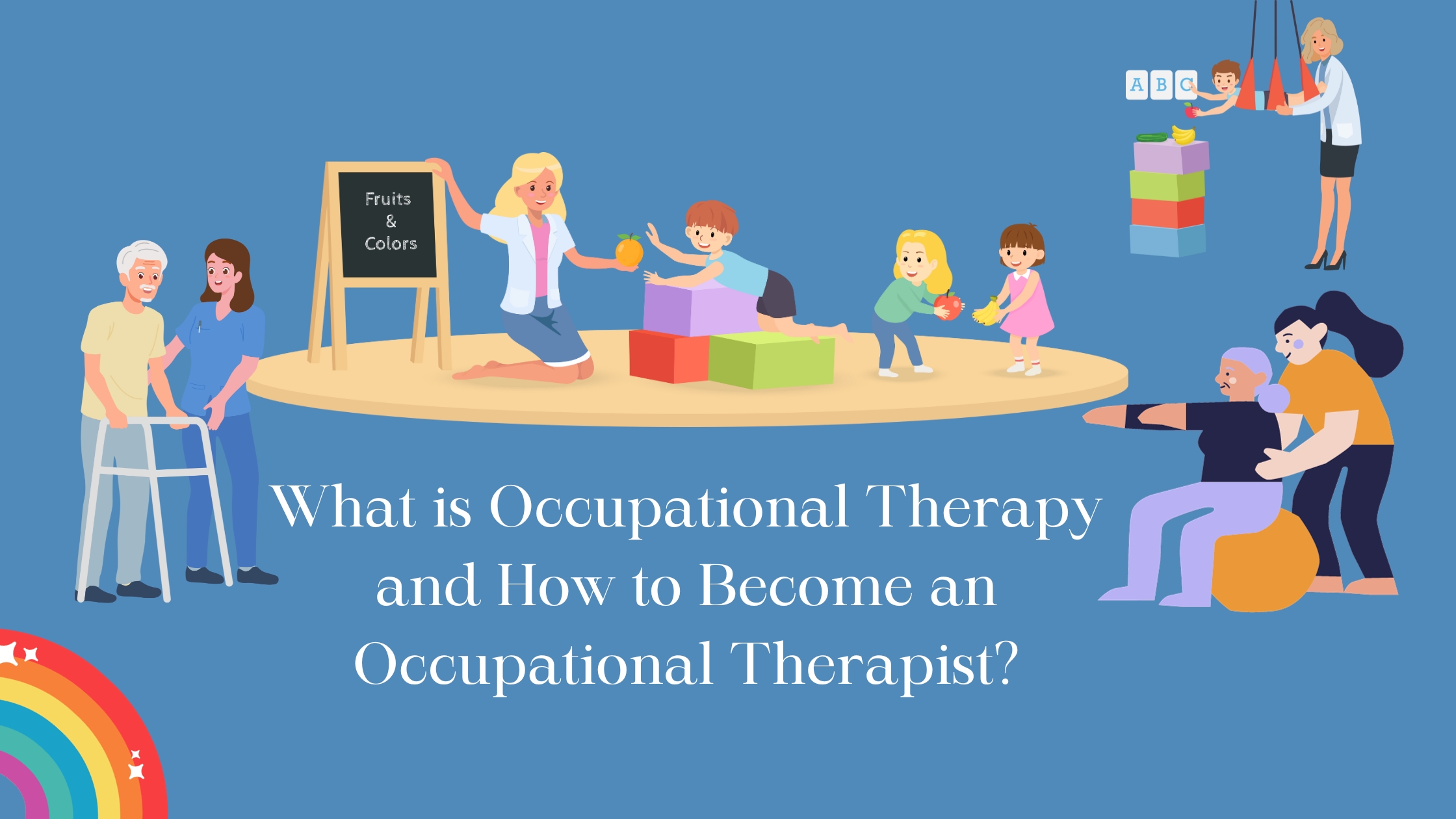
Occupational therapy (OT) is a dynamic and client-centered health profession dedicated to enhancing individuals’ ability to engage in meaningful daily activities. Occupational therapists work across diverse settings, employing a holistic approach to address physical, cognitive, emotional, and developmental challenges that impact participation in everyday life. By tailoring interventions to each client’s unique needs, OT aims to empower individuals of all ages, fostering optimal independence and well-being. Whether assisting with fine motor skill development in children, supporting adults in regaining work-related abilities, or aiding seniors in maintaining independence, occupational therapy transforms obstacles into opportunities for growth and independence. At its core, OT embodies a commitment to promoting participation, inclusion, and a renewed sense of purpose in the lives of those it serves.
What is Occupational Therapy?
Occupational therapy (OT) is a health profession dedicated to helping individuals of all ages overcome challenges and achieve optimal functioning in their daily lives. Occupational therapists, the professionals in this field, work with individuals who may be facing physical, cognitive, emotional, or developmental difficulties.
The primary goal of occupational therapy is to enable individuals to engage in meaningful activities or occupations that are essential to their well-being and independence. These occupations encompass a wide range of activities, including self-care tasks, work-related activities, play, and leisure pursuits.
Occupational therapists employ a holistic and client-centered approach, considering not only the physical aspects of an individual’s condition but also their cognitive, emotional, and social well-being. Through assessments, interventions, and personalized care plans, occupational therapists address specific challenges individuals may face, helping them develop, recover, or maintain the skills needed for daily living.
The Pathway to Become an Occupational Therapist:
Embarking on the journey to become an occupational therapist is a rewarding venture that combines passion, education, and practical experience. If you’re intrigued by the prospect of helping individuals regain independence and improve their quality of life, follow this comprehensive roadmap to guide you through the essential steps.
1. Lay the Foundation:
Begin your journey by earning a bachelor’s degree. While there isn’t a specific undergraduate major required, many aspiring occupational therapists choose degrees in biology, psychology, sociology, or other related fields. Ensure your coursework includes prerequisite classes that are often required for admission to graduate programs in occupational therapy.
2. Research Graduate Programs:
Explore accredited graduate programs in occupational therapy. Look for institutions that align with your goals, offer comprehensive coursework, and provide valuable clinical experiences. The program should be accredited by the Accreditation Council for Occupational Therapy Education (ACOTE) to ensure its legitimacy and quality.
3. Pursue a Master’s or Doctoral Degree:
Enroll in a master’s or doctoral program in occupational therapy. The majority of occupational therapists hold a master’s degree, but doctoral programs (OTD) are becoming increasingly popular. These programs typically take two to three years to complete and include both classroom instruction and hands-on clinical experiences.
4. Fulfill Clinical Requirements:
Clinical fieldwork is a critical component of occupational therapy education. These practical experiences provide you with hands-on training in various settings, such as hospitals, schools, and rehabilitation centers. Engage wholeheartedly in your clinical placements to develop the skills necessary for success in the field.
5. Stay Informed and Network:
Join professional organizations such as the American Occupational Therapy Association (AOTA) to stay informed about industry trends, research, and networking opportunities. Attend conferences, seminars, and workshops to connect with seasoned professionals and stay abreast of advancements in occupational therapy.
6. Obtain Licensure:
After completing your education and clinical fieldwork, you must obtain licensure to practice as an occupational therapist. Licensure requirements vary by state, so research and fulfill the specific criteria for the state in which you intend to work. This often involves passing the National Board for Certification in Occupational Therapy (NBCOT) exam.
7. Consider Specialization:
Occupational therapy offers various specializations such as pediatrics, geriatrics, mental health, and more. Consider pursuing additional certifications or specialized training to enhance your expertise and broaden your career options.
8. Pursue Continuing Education:
The field of occupational therapy is dynamic, with ongoing advancements in research and techniques. Stay competitive and broaden your skill set by engaging in continuing education courses. This commitment to lifelong learning will ensure you provide the best possible care to your clients.
9. Build a Strong Resume:
Craft a compelling resume that highlights your education, clinical experiences, certifications, and any specialized training. Showcase your commitment to ongoing professional development and your passion for occupational therapy.
10. Launch Your Career:
Once you’ve completed these steps, you’re ready to launch your career as a qualified occupational therapist. Seek employment opportunities in diverse settings such as hospitals, schools, private practices, or community organizations.
Remember, becoming an occupational therapist is not just about acquiring knowledge; it’s a journey of personal and professional growth. Embrace each step, cultivate your skills, and contribute to the transformative field of occupational therapy. Your dedication will not only open doors for you but also make a meaningful difference in the lives of those you serve.
Whether you’re sculpting your path toward becoming an occupational therapist or seeking to amplify your skills through continuing education, this course subject list promises a diverse and enriching experience, with a special focus on pediatric occupational therapy CEU courses in Texas.
Course Subjects
Building Foundations:
Dive into the essentials with “Introduction to Occupational Therapy,” where the magic of therapy unfolds. Understand the intricacies of the human body in “Anatomy and Physiology,” and explore the nuances of growth and development with “Human Development and Psychology.”
Assessment Mastery:
Hone your assessment skills in “Occupational Therapy Assessments,” embark on mastering diagnostic tools and techniques crucial for evaluation, and specialize in evaluating the unique developmental needs of children.
Crafting Intervention Techniques:
Engage in creative and effective “Therapeutic Activities for Children,” learn sensory integration techniques to address diverse pediatric needs, and immerse yourself in the world of play-based interventions for children.
Technological Solutions:
Explore the role of technology in “Introduction to Assistive Technology,” understand the application of mobility aids and devices for children, and delve into the realm of Augmentative and Alternative Communication (AAC) Devices.
Pediatric Focus:
Navigate the intricacies of “Pediatric Neurology and Conditions,” explore developmental milestones and their significance, and learn early intervention strategies crucial for pediatric care.
Evidence-Based Excellence:
Uncover the secrets of robust research methods in “Research Methods in Occupational Therapy,” apply evidence effectively in clinical decision-making, and implement research findings in the context of pediatric occupational therapy.
Ethics, Professionalism, and Diversity:
Delve into the ethical considerations of occupational therapy, navigate the legal landscape and ethical nuances in pediatric care, and embrace cultural sensitivity and family-centered care approaches.
Continual Learning:
Embrace the spirit of lifelong learning within the field, stay current with evolving practices in pediatric occupational therapy, and elevate your expertise with advanced techniques tailored for pediatric care.
Interdisciplinary Harmony:
Foster collaboration with pediatricians and specialists, understand the dynamics of school-based practice and collaboration and integrate care seamlessly within pediatric rehabilitation settings.
Leadership and Management Insights:
Shape pediatric OT programs with “Pediatric OT Program Development,” develop leadership skills tailored for pediatric healthcare, and gain insights into the business aspects of pediatric occupational therapy.
What are the Skills Of An Occupational Therapist?
Interpersonal and Communication Skills:
Occupational therapists excel in building strong interpersonal skills and effective communication. Establishing trust with clients and collaborating with healthcare professionals requires clear verbal, non-verbal, and written communication. The ability to connect with individuals from diverse backgrounds enhances the therapeutic process.
Empathy and Observation:
A hallmark of occupational therapy is the cultivation of empathy. Occupational therapists understand and share in their clients’ challenges, fostering a supportive and empathetic environment. Keen observational skills complement this empathy, allowing therapists to discern subtle cues in clients’ movements and behaviors, enabling accurate assessments and tailored interventions.
Problem-Solving and Creativity:
Occupational therapists are adept problem solvers, navigating complex situations to identify barriers to function. Creativity plays a pivotal role in developing engaging and innovative therapeutic activities. This skill is crucial for addressing clients’ unique needs and achieving therapeutic goals through inventive approaches.
Adaptability and Time Management:
Flexibility is a key trait in occupational therapy, given the evolving nature of clients’ needs. Occupational therapists must adapt interventions and treatment plans to changing circumstances. Accompanying this adaptability is strong time management, allowing therapists to efficiently balance the demands of working with multiple clients while delivering high-quality care.
Collaboration and Cultural Competence:
Collaboration is integral to occupational therapy, involving teamwork with healthcare professionals, caregivers, and educators. Occupational therapists exhibit strong collaborative skills to ensure holistic and coordinated care. Additionally, cultural competence is vital for understanding and respecting diverse backgrounds, facilitating effective communication, and ensuring interventions align with individual values.
To End On A High Note
The journey to becoming a pediatric occupational therapist is a transformative experience encompassing academic rigor, practical skills, and a commitment to improving lives. From foundational education to specialized courses, the pathway involves continuous learning and ethical practice. The outlined course subjects provide a comprehensive guide for mastering assessments, crafting interventions, and staying current in the dynamic field. Aspiring therapists contribute not only to their personal growth but also to society, making a meaningful impact on the well-being of children. In this journey, dedication to excellence becomes a beacon for compassionate care, innovation, and lasting positive change.




